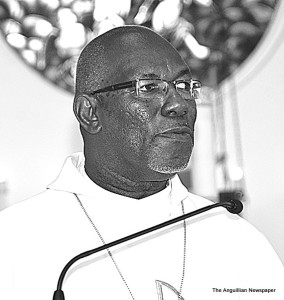
The Right Reverend L Errol Brooks has given some specific suggestions which he said “will keep us alive all our life.” He offered the proposals while delivering the sermon during the Funeral Eucharist for the late Mr Charles C. Gumbs on Saturday, May 17, at St Mary’s Anglican Church.
The suggestions, which many persons may find useful, are as follows:
1. Do not give in to procrastination
“Procrastination is the great enemy for all of us. How much of the good and beautiful, the exciting and the great positive, never happen because we procrastinate to the point that the opportunity spends itself? William James, the great psychologist, gave some powerful advice when he said, ‘Seek the first possible opportunity to act on every good resolution you make.’
“As we grow old, the temptation is to procrastinate – to put off things. We do that because we think we have all the time in the world, and there is no point in being in a hurry. That can become a negative habit. Procrastination can become a way of life; and it doesn’t add anything positive or creative to life. Do not give in to procrastination.
2. Do not use age as an excuse
“There are some benefits and privileges that come to us as we grow older – reduced airfares; in some places, seniors do not pay embarkation tax; they enjoy the privilege of cheap bus fares; low or no medical bills. But there is a real danger that we will use age as an excuse. The danger is that we will fall into the snare of taking preferential treatment for granted rather than being appreciative of it when it occurs. Some people view age as a right to be short-tempered, anxious rather than calm, demanding rather than generous and giving, set in ways rather than flexible and spontaneous. Do not use age as an excuse.
“That is one level of the problem of using growing old as an excuse. Another level has to do with using age as an excuse for being less capable and less useful. True, energy wanes with age – we slow down. But I am speaking about the common myth that says that as we grow old, we automatically become less capable and useful. History is studded with examples of men and women who accomplished great feats in their old age. So don’t used growing old as an excuse not to be capable and useful.
3. Keep a struggle going – keep something in your life for which you have to struggle, something which will demand commitment, energy and imagination.
“Again this is a problem that plagues us throughout our life – the perverted notion about contentment. There is a contentment we need – the contentment that forces us from the clamour of drives and desires which make us slaves to things and possessions, to potential fame. The contentment that frees us from being the servant of our appetites and ambitions; the contentment that lets us be at peace with ourselves in the face of all external pressures that move in upon us; the contentment that breaks us free from an obsession with influence and power; a contentment that cuts us loose from an obsession with affluence and the false power that it brings. In contrast, there is a contentment that may destroy. Once a person arrives at a stage of commitment with what he is, he has stalled, gone stale, stagnated. If we are content to be what we are and rest on what we have done, we will never become our best. Becoming our best is an ongoing process. We need to struggle on.
“There are persons in this gathering and the wider community, I am sure, who no longer work to earn a living – persons who are physically fit, whose minds are agile and creative, persons who can volunteer to assist our young people or an organisation in the good work they are doing. You can make a worthwhile contribution. Get involved.
4. Know what time it is
“The big temptation of age is to focus on the past – losing ourselves in the beautiful memories of success and love and loneliness, or burdening ourselves with the pain of failure and guilt. Age should remind us of what the psalmist expressed so forcefully – the frailty of life, ‘Our years come to an end like a sigh’. We must guard against the great lie in life, that is, ‘There is always tomorrow.’ You may argue that that is no lie. But even if there is always tomorrow, the older we get, the fewer tomorrows there are.
“I urge you: Always know what time it is. Death is around the corner. It is around the corner for all of us. The older we are, the more certain it is that death is just around the corner for us. If you know what time it is, you will be investing most of your attention to your relationship with God. What are you doing to bring others, especially your loved ones, into a closer relationship with Christ?”







